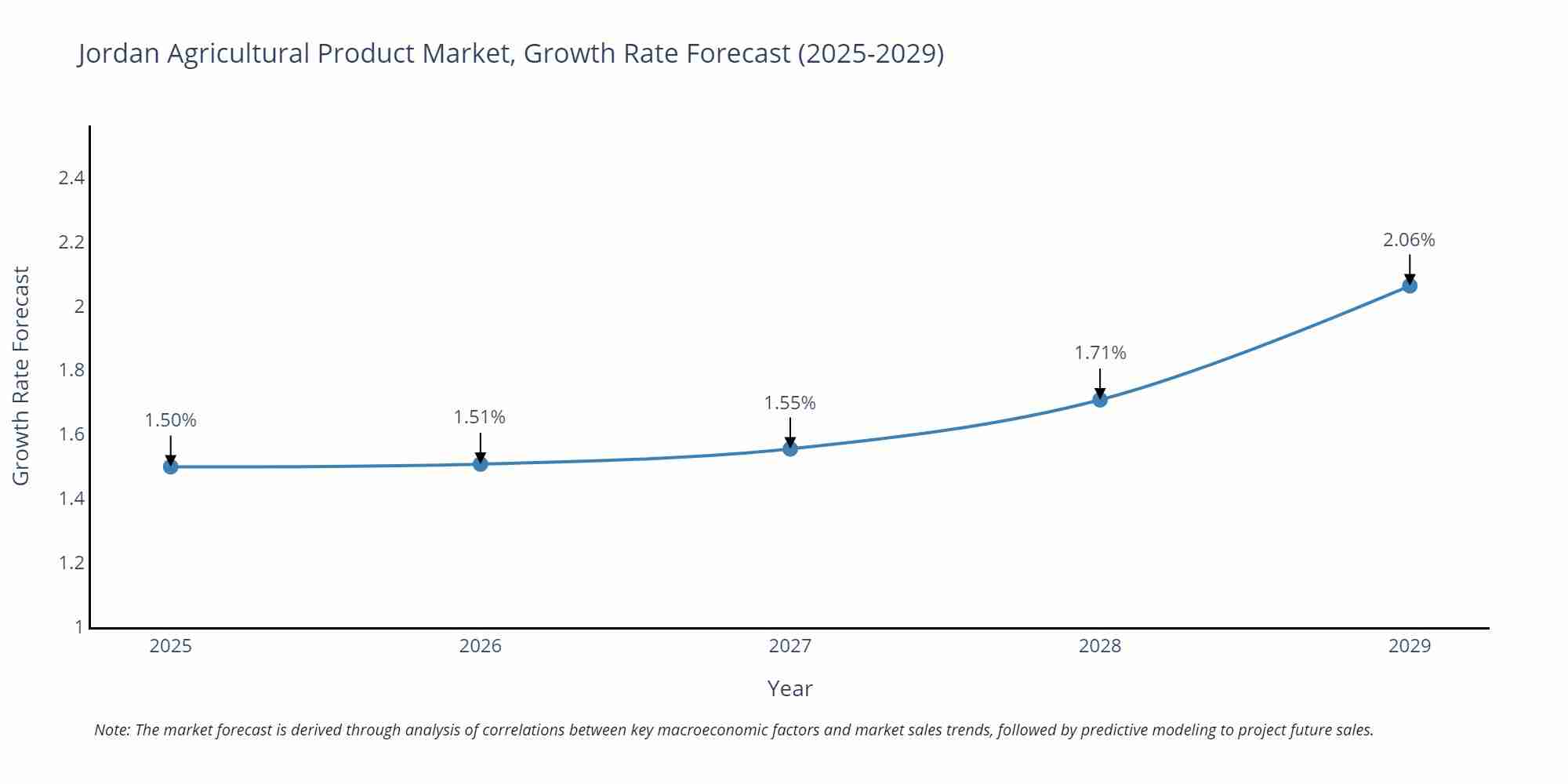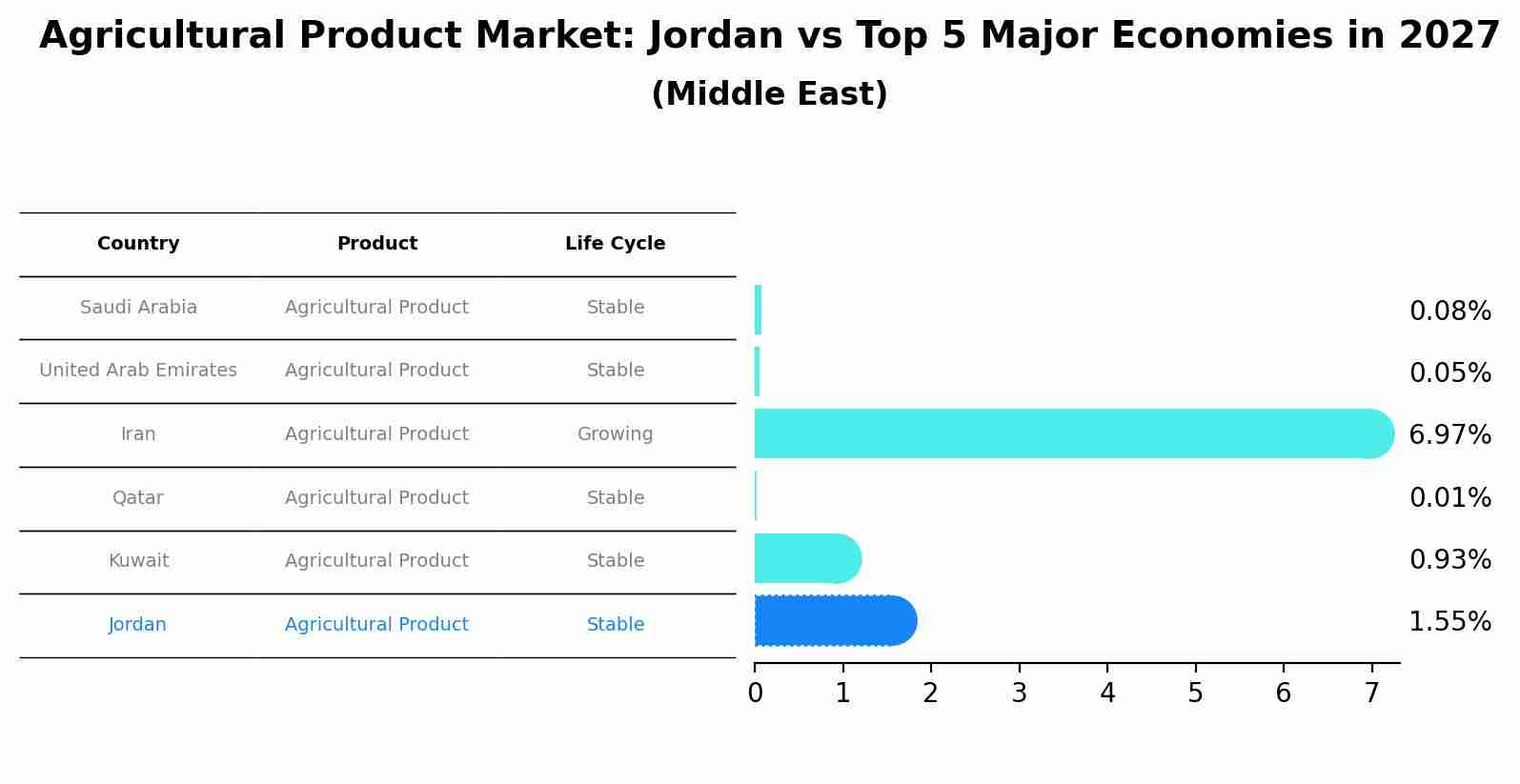Jordan Agricultural Product Market (2025-2031) Outlook | Share, Growth, Trends, Industry, Size, Analysis, Revenue, Companies, Forecast & Value
| Product Code: ETC379666 | Publication Date: Aug 2022 | Updated Date: Jul 2025 | Product Type: Market Research Report | |
| Publisher: 6Wresearch | Author: Sachin Kumar Rai | No. of Pages: 75 | No. of Figures: 35 | No. of Tables: 20 |
Jordan Agricultural Product Market Size Growth Rate
The Jordan Agricultural Product Market is likely to experience consistent growth rate gains over the period 2025 to 2029. Commencing at 1.50% in 2025, growth builds up to 2.06% by 2029.

Agricultural Product Market: Jordan vs Top 5 Major Economies in 2027 (Middle East)
The Agricultural Product market in Jordan is projected to grow at a stable growth rate of 1.55% by 2027, highlighting the country's increasing focus on advanced technologies within the Middle East region, where Saudi Arabia holds the dominant position, followed closely by United Arab Emirates, Iran, Qatar and Kuwait, shaping overall regional demand.

Jordan Agricultural Product Market Synopsis
The Jordanian agricultural product market is diverse and includes a wide range of products such as fruits, vegetables, olives, dairy products, and grains. Agriculture plays a significant role in Jordan`s economy, contributing to employment and food security. The country`s arid climate and limited water resources present challenges for agriculture, leading to a focus on water-efficient farming techniques and the cultivation of drought-resistant crops. Jordan also has a growing organic farming sector, catering to the increasing demand for organic and sustainable products both domestically and in export markets. The government supports the agricultural sector through various initiatives and subsidies to promote productivity and sustainability. Overall, the Jordanian agricultural product market presents opportunities for both traditional and innovative farming practices to thrive and meet the demands of local and international consumers.
Jordan Agricultural Product Market Trends
In the Jordan Agricultural Product Market, there are several notable trends currently shaping the industry. One key trend is the increasing demand for organic and locally grown produce, driven by consumers` growing interest in healthier and more sustainable food options. This trend is leading to a rise in small-scale organic farming and the establishment of farmers` markets and direct-to-consumer sales channels. Another trend is the adoption of technology and modern agricultural practices to improve efficiency and productivity in the sector. Additionally, there is a growing focus on water conservation and sustainable farming methods in response to Jordan`s water scarcity challenges. Overall, these trends are influencing the way agricultural products are produced, distributed, and consumed in the Jordanian market.
Jordan Agricultural Product Market Challenges
In the Jordan Agricultural Product Market, several challenges are faced, including water scarcity due to limited water resources and increasing demand for irrigation in agriculture. This poses a significant threat to the sustainability of farming practices in the region. Additionally, fluctuations in weather patterns and climate change impact crop yields and productivity, leading to uncertainty for farmers. Limited access to modern technologies and agricultural practices further hinders the efficiency and competitiveness of the sector. Market access and distribution channels are also challenging, affecting the ability of farmers to reach consumers effectively. Addressing these challenges through sustainable water management strategies, technology adoption, and improved market infrastructure is crucial for the long-term success and growth of the agricultural sector in Jordan.
Jordan Agricultural Product Market Investment Opportunities
The Jordan Agricultural Product Market offers several investment opportunities for potential investors. With a focus on water-efficient farming techniques and technology, there is a growing demand for innovative solutions to improve crop yields in the arid climate. Investing in greenhouse farming, hydroponics, and drip irrigation systems can be lucrative options in Jordan. Additionally, there is a market for organic farming and specialty crops such as dates, olives, and herbs, which have high export potential. Collaborating with local farmers to introduce sustainable practices and improve supply chain efficiency could also be a promising investment opportunity in the Jordanian agricultural sector. Overall, investing in agricultural technologies and value-added products can help capitalize on the growing demand for high-quality produce both domestically and internationally.
Jordan Agar Market Government Policies
The Jordanian government has implemented various policies to support the agricultural product market, including subsidies for farmers, investment in irrigation systems, and the promotion of sustainable agriculture practices. The government has also established regulations to ensure food safety and quality standards are met, as well as to promote fair trade practices within the market. Additionally, the government has encouraged research and development in the agricultural sector to enhance productivity and competitiveness. Overall, these policies aim to enhance the growth and stability of the agricultural product market in Jordan, while also promoting food security and sustainability in the country.
Jordan Agricultural Product Market Future Outlook
The future outlook for the Jordan Agricultural Product Market appears promising, with anticipated growth driven by increased government support, technological advancements, and changing consumer preferences. The government`s focus on promoting sustainable agriculture practices and providing financial incentives to farmers is expected to boost production levels and enhance product quality. Additionally, the adoption of modern farming techniques and irrigation systems is likely to improve efficiency and yield rates. With a growing awareness of the importance of organic and locally sourced foods among consumers, there is a rising demand for premium agricultural products in the market. Overall, the Jordan Agricultural Product Market is poised for expansion, offering opportunities for both local farmers and investors to capitalize on the evolving landscape.
Key Highlights of the Report:
- Jordan Agricultural Product Market Outlook
- Market Size of Jordan Agricultural Product Market, 2024
- Forecast of Jordan Agricultural Product Market, 2031
- Historical Data and Forecast of Jordan Agricultural Product Revenues & Volume for the Period 2021 - 2031
- Jordan Agricultural Product Market Trend Evolution
- Jordan Agricultural Product Market Drivers and Challenges
- Jordan Agricultural Product Price Trends
- Jordan Agricultural Product Porter's Five Forces
- Jordan Agricultural Product Industry Life Cycle
- Historical Data and Forecast of Jordan Agricultural Product Market Revenues & Volume By Type for the Period 2021 - 2031
- Historical Data and Forecast of Jordan Agricultural Product Market Revenues & Volume By Food for the Period 2021 - 2031
- Historical Data and Forecast of Jordan Agricultural Product Market Revenues & Volume By Fiber for the Period 2021 - 2031
- Historical Data and Forecast of Jordan Agricultural Product Market Revenues & Volume By Fuel for the Period 2021 - 2031
- Historical Data and Forecast of Jordan Agricultural Product Market Revenues & Volume By Raw Material for the Period 2021 - 2031
- Historical Data and Forecast of Jordan Agricultural Product Market Revenues & Volume By Application for the Period 2021 - 2031
- Historical Data and Forecast of Jordan Agricultural Product Market Revenues & Volume By Direct Consumption for the Period 2021 - 2031
- Historical Data and Forecast of Jordan Agricultural Product Market Revenues & Volume By Food & Fabrics for the Period 2021 - 2031
- Historical Data and Forecast of Jordan Agricultural Product Market Revenues & Volume By Construction & Paper Products for the Period 2021 - 2031
- Historical Data and Forecast of Jordan Agricultural Product Market Revenues & Volume By Others for the Period 2021 - 2031
- Historical Data and Forecast of Jordan Agricultural Product Market Revenues & Volume By Industry Vertical for the Period 2021 - 2031
- Historical Data and Forecast of Jordan Agricultural Product Market Revenues & Volume By Food & Nutrition for the Period 2021 - 2031
- Historical Data and Forecast of Jordan Agricultural Product Market Revenues & Volume By Sustainable Agribusiness for the Period 2021 - 2031
- Historical Data and Forecast of Jordan Agricultural Product Market Revenues & Volume By Production & Harvesting for the Period 2021 - 2031
- Historical Data and Forecast of Jordan Agricultural Product Market Revenues & Volume By Agribusiness Technological Inputs for the Period 2021 - 2031
- Historical Data and Forecast of Jordan Agricultural Product Market Revenues & Volume By Others for the Period 2021 - 2031
- Jordan Agricultural Product Import Export Trade Statistics
- Market Opportunity Assessment By Type
- Market Opportunity Assessment By Application
- Market Opportunity Assessment By Industry Vertical
- Jordan Agricultural Product Top Companies Market Share
- Jordan Agricultural Product Competitive Benchmarking By Technical and Operational Parameters
- Jordan Agricultural Product Company Profiles
- Jordan Agricultural Product Key Strategic Recommendations
Frequently Asked Questions About the Market Study (FAQs):
- Single User License$ 1,995
- Department License$ 2,400
- Site License$ 3,120
- Global License$ 3,795
Search
Thought Leadership and Analyst Meet
Our Clients
Related Reports
- Afghanistan Apparel Market (2026-2032) | Growth, Outlook, Industry, Segmentation, Forecast, Size, Companies, Trends, Value, Share, Analysis & Revenue
- Canada Oil and Gas Market (2026-2032) | Share, Segmentation, Value, Industry, Trends, Forecast, Analysis, Size & Revenue, Growth, Competitive Landscape, Outlook, Companies
- Germany Breakfast Food Market (2026-2032) | Industry, Share, Growth, Size, Companies, Value, Analysis, Revenue, Trends, Forecast & Outlook
- Australia Briquette Market (2025-2031) | Growth, Size, Revenue, Forecast, Analysis, Trends, Value, Share, Industry & Companies
- Vietnam System Integrator Market (2025-2031) | Size, Companies, Analysis, Industry, Value, Forecast, Growth, Trends, Revenue & Share
- ASEAN and Thailand Brain Health Supplements Market (2025-2031) | Strategy, Consumer Insights, Analysis, Investment Trends, Opportunities, Growth, Size, Share, Industry, Revenue, Segments, Value, Segmentation, Supply, Forecast, Restraints, Outlook, Competition, Drivers, Trends, Demand, Pricing Analysis, Competitive, Strategic Insights, Companies, Challenges
- ASEAN Bearings Market (2025-2031) | Strategy, Consumer Insights, Analysis, Investment Trends, Opportunities, Growth, Size, Share, Industry, Revenue, Segments, Value, Segmentation, Supply, Forecast, Restraints, Outlook, Competition, Drivers, Trends, Demand, Pricing Analysis, Competitive, Strategic Insights, Companies, Challenges
- Europe Flooring Market (2025-2031) | Outlook, Share, Industry, Trends, Forecast, Companies, Revenue, Size, Analysis, Growth & Value
- Saudi Arabia Manlift Market (2025-2031) | Outlook, Size, Growth, Trends, Companies, Industry, Revenue, Value, Share, Forecast & Analysis
- Uganda Excavator, Crane, and Wheel Loaders Market (2025-2031) | Strategy, Consumer Insights, Analysis, Investment Trends, Opportunities, Growth, Size, Share, Industry, Revenue, Segments, Value, Segmentation, Supply, Forecast, Restraints, Outlook, Competition, Drivers, Trends, Demand, Pricing Analysis, Competitive, Strategic Insights, Companies, Challenges
Industry Events and Analyst Meet
Whitepaper
- Middle East & Africa Commercial Security Market Click here to view more.
- Middle East & Africa Fire Safety Systems & Equipment Market Click here to view more.
- GCC Drone Market Click here to view more.
- Middle East Lighting Fixture Market Click here to view more.
- GCC Physical & Perimeter Security Market Click here to view more.
6WResearch In News
- Doha a strategic location for EV manufacturing hub: IPA Qatar
- Demand for luxury TVs surging in the GCC, says Samsung
- Empowering Growth: The Thriving Journey of Bangladesh’s Cable Industry
- Demand for luxury TVs surging in the GCC, says Samsung
- Video call with a traditional healer? Once unthinkable, it’s now common in South Africa
- Intelligent Buildings To Smooth GCC’s Path To Net Zero


















